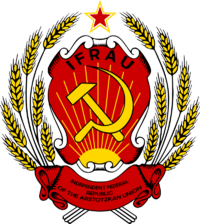March 2024 Foreign Policy of the Arstotzkan Union
| March 2024 Foreign Policy of the Arstotzkan Union | |
|---|---|
 | |
| Third Session of the Executive Committee | |
| The Foreign Policy directed by Chairman of Foreign Affairs and Trade, First President Ethan Brinkman of the Independent Federal Republic of the Arstotzkan Union, aided by the Foreign Affairs Committee of the Department of Foreign Affairs and Trade in an effort to codify the foreign policy of Arstotzkan Union in the month of March 2024 | |
| Territorial extent | Arstotzkan Union |
| Date enacted | 20 March 2024 |
| Related legislation | |
| August 2023 Foreign Policy of the Arstotzkan Union | |
| Status: Current legislation | |
The March 2024 Foreign Policy of the Arstotzkan Union is the fifth and latest foreign relations document published for the Arstotzkan Union. It is also the first foreign policy created by the new Department of Foreign Affairs and Trade.
The legislation also outlines specific provisions regarding recognition of micronations and macronations, including exceptions and preferred alliances. It details relationships with nations such as Cuba, Vietnam, and Australia, as well as neutral stances toward others like Lebanon and Cyprus. Additionally, it addresses recognition of breakaway states and outlines the Arstotzkan Union's stance on the Israeli-Palestinian conflict.
The policy also removes New Zealand from the list of nations in highest standing and puts it on the level of good-standing relations. This was done due to the rise in far-right conservative politics in New Zealand which has been seen by many in the Arstotzkan Federal Government as threating to the national security of the nation.
Contents
Similar to the previous foreign policy document, the March 2024 policy covers four basic areas.
Recognition Criteria:
The Arstotzkan Union commits to officially recognizing nations that align with its values and principles. Recognition is granted based on recommendations from the Chairman of Foreign Affairs and Trade and the Executive Committee.
Grounds for Recognition Removal:
The legislation outlines specific circumstances under which recognition of a foreign entity may be revoked. These include breaches of international human rights, malicious violations of sovereignty, or actions that threaten national security.
Alliance and Sanctions:
The Arstotzkan Union, in collaboration with allied members of the United Micronations Treaty Alliance, imposes democratic embargoes and sanctions on members of the Coalition of United Micronations under certain conditions, emphasizing the importance of collective action in maintaining peace and security.
Amendment Procedures:
Procedures for amending the Foreign Policy are outlined, providing avenues for changes at the discretion of the First President, with the unanimous request from the Executive Committee, or upon request from the Chairman of Foreign Affairs and Trade.